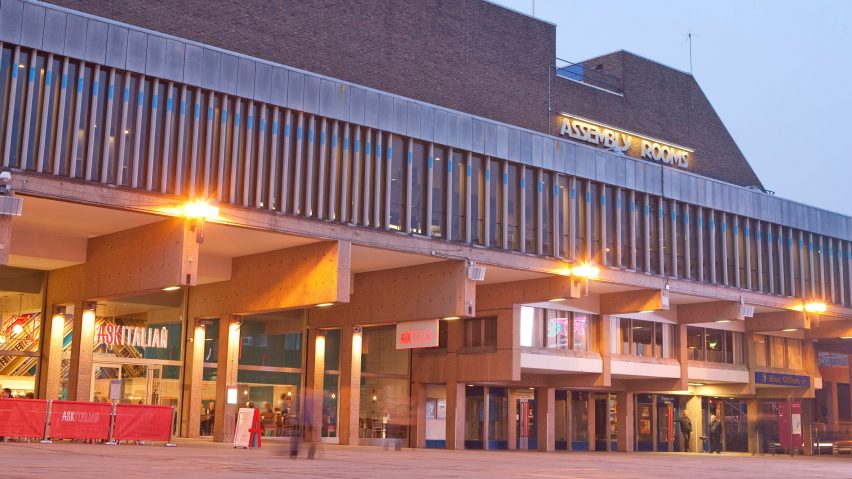
Brutalist building in Derby set to be demolished without plans for replacement
The brutalist Derby Assembly Rooms venue in the East Midlands, England is set to be demolished by the local council, though plans for its replacement are yet to be put in place.
The concrete edifice, which is located in Derby's medieval market place, was completed by Casson, Conder & Partners in 1977 for use as an events venue.
It was due to be refurbished by Derby City Council after a fire forced its closure in 2014. However, officials recently scrapped these plans due to spiralling costs and turned their focus to building a new events venue elsewhere.
The announcement has sparked uproar from architects and heritage groups across the UK who share concerns that the demolition will negatively impact both the environment and the city.
Pop-up market will be short-term replacement
While the council's long-term plans for the site continue to be debated, officials have published a short-term vision for the site that imagines it as an outdoor, pop-up market.
According to the council, a pop-up market will prevent the site from becoming disused and ensure it contributes to the city "at the earliest opportunity" post-demolition.
"We are already working on options for permanent long term redevelopment but we also have exciting plans so that the site can be used until then for a range of uses including varied outdoor markets, pop up retail, green space, food, drink and events," said Matthew Holmes, deputy leader of Derby City Council.
"This will ensure, as we promised, that the site is not left as 'a hole in the ground' or boarded off, something that we know is a concern for local businesses and city residents and for the council."
Plans set back by objections
The council's application for demolition will come before the city's planning committee on Thursday 15 April. It was initially submitted in August 2020 but pushed back in response to a petition and substantial opposition, as reported by the Derby Telegraph.
Leading the petition is architect Robert Evans, who is the founding director of Derbyshire studio Evans Vettori.
"This building is arguably the finest 20th-century building in the City of Derby," Evans writes in the petition.
"Quite apart from the architectural quality of this important civic building there is a strong argument on environmental grounds for the re-use of buildings containing significant amounts of embodied energy," it continues.
"It would be simply disgraceful for this distinguished building to be destroyed."
Demolition would be "enormous cultural loss"
Nottingham and Derby Society of Architects has also shared its concerns, arguing that "the greenest building is the building already built".
The Twentieth Century Society, a charity that campaigns for the preservation of architectural heritage, also said the building should be preserved.
"This is a very well designed building which should be listed, it's nationally important and has strong local support from many who can see its great potential," wrote its director, Catherine Croft. "It would be an enormous cultural loss to Derby if it was demolished."
On Twitter, the Twentieth Century Society's trustee Otto Saumarez Smith also slated the plans, describing the demolition and pop-up market proposal as a "grotesque failure of imagination".
The Derby Assembly Rooms are the latest in a string of notable brutalist buildings from the 1960s and 1970s to face demolition over the last decade. Elsewhere in the UK, this includes the Robin Hood Gardens housing estate and the Welbeck Street car park, both in London.
In the US, Paul Rudolph's Shoreline Apartments in New York have also been demolished, as well as his Burroughs Wellcome building in North Carolina – despite attempts to save it.
Photo is courtesy of Derby City Council.